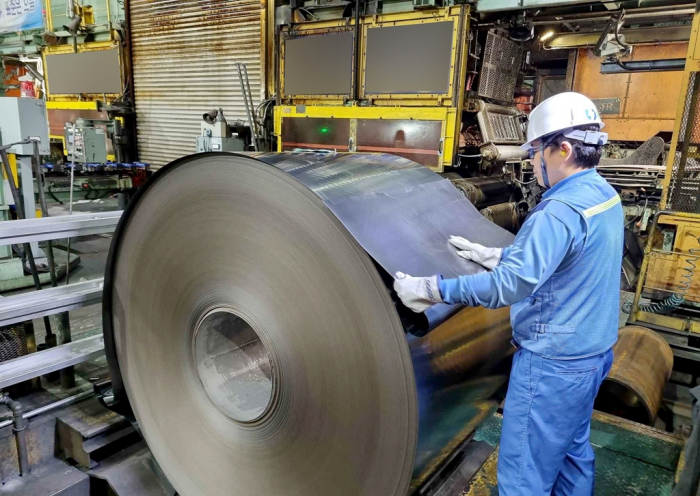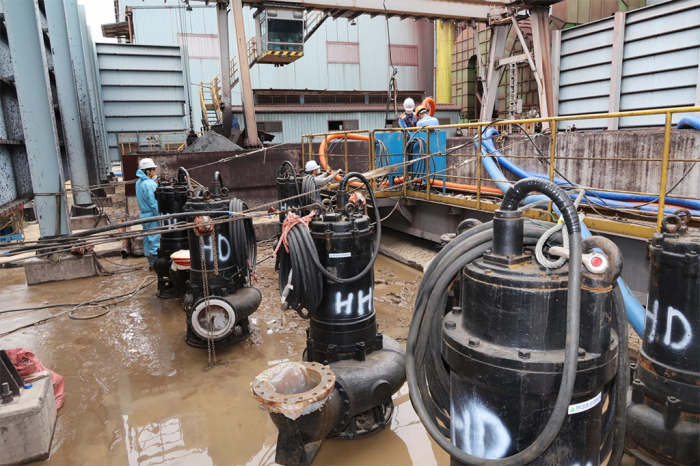Steel
POSCO expects typhoon to reduce sales by $1.5 billion
POSCO may seek imports of key products such as hot rolled steel from its own overseas plants to stabilize Korean steel supply
By Sep 16, 2022 (Gmt+09:00)
3
Min read
Most Read
LG Chem to sell water filter business to Glenwood PE for $692 million


Kyobo Life poised to buy Japan’s SBI Group-owned savings bank


KT&G eyes overseas M&A after rejecting activist fund's offer


StockX in merger talks with Naver’s online reseller Kream


Mirae Asset to be named Korea Post’s core real estate fund operator



POSCO, the world’s sixth-largest steelmaker, has predicted sales to fall by $1.5 billion as a typhoon disrupted one of its plants in South Korea, while reiterating its pledge to return the steel mill to full operation in three months.
The country’s No. 1 steelmaker said on Friday it estimated a production loss of 1.7 million tons at Pohang Steel Works, which was hammered by Typhoon Hinnamnor last week. The loss represents more than 10% of the plant’s crude steel output of 16.9 million tons last year.
POSCO aims to minimize the reduction in sales volume to 970,000 tons by maximizing the operation of the other plant in Gwangyang, which was not affected by the storm, and utilizing the inventory.
That was expected to result in a cut in sales by 2 trillion won ($1.5 billion), 5.1% of its sales of 39.9 trillion won on a separate basis in 2021, according to the steelmaker’s estimate. In the second quarter, it logged an operating profit of 1.3 trillion won based on sales of 11.9 trillion won.
Last week, the country’s top steelmaker shut down all of its three blast furnaces at Pohang Steel Works for the first time in 49 years due to the typhoon. The company has since restarted all of the furnaces but some other facilities remain idle.
Shares in POSCO Holdings Inc., its holding company, lost ground after the disaster. They have lost 8.7% in Seoul’s main stock market since Sept.6 when the storm hit the plant, far underperforming a 0.3% dip in the wider Kospi.
NORMALIZATION IN THREE MONTHS
POSCO said restoration work was making progress to operate all facilities at the plant in three months.
It normalized on Thursday facilities that remove impurities from molten iron produced from furnaces and adjust its ingredients for customer needs, while completing restoration work for steel slab production lines. An electrical steel sheet line, which was hit relatively less severely, resumed operations in the day.
The company is also speeding up work to reinstate rolling facilities that process steel with heat and pressure.
“We are expediting restoration work for the rolling units such as removing mud, washing facilities and fixing parts by dispatching more manpower and equipment,” said a company official.

ENOUGH INVENTORY FOR UP TO THREE MONTHS
POSCO said its customers and wholesalers currently have stocks of key products such as hot rolled steel and stainless for two to three months, which are sufficient to avoid an immediate steel supply disruption. Its Gwangyang complex produces most of the steel sheets for automakers and some of the plates for shipbuilders.
The company still plans to actively seek measures such as the use of its own inventory to stabilize the local steel supply during the restoration work.
It is poised to produce at the Gwangyang plant stainless and electrical steel sheets, which had been manufactured only in Pohang. It is also reprocessing slightly damaged products for prompt shipments after discussions with customers.
In addition, it will consider importing major products such as plates, hot and cold rolled steel, as well as stainless steel from its own overseas production units in China, India and Indonesia.
The impact of POSCO’s plant outage on the automobile, shipbuilding and home appliances and other industries may not be serious if the steel mill is normalized in three months as planned, industry sources said.
Write to Kyung-Min Kang and Ik-Hwan Kim at kkm1026@hankyung.com
Jongwoo Cheon edited this article.
More to Read
-

-
 The Deep DiveTyphoon may offer Korea excuse it needs to oust POSCO CEO
The Deep DiveTyphoon may offer Korea excuse it needs to oust POSCO CEOSep 15, 2022 (Gmt+09:00)
5 Min read -
 SteelPOSCO partially restarts Pohang furnaces flooded by typhoon
SteelPOSCO partially restarts Pohang furnaces flooded by typhoonSep 12, 2022 (Gmt+09:00)
2 Min read -
 SteelTyphoon Hinnamnor shuts all POSCO furnaces for 1st time in 49 years
SteelTyphoon Hinnamnor shuts all POSCO furnaces for 1st time in 49 yearsSep 07, 2022 (Gmt+09:00)
1 Min read -
 EconomyShipyards, TV plants to shut down as typhoon lands on Korea
EconomyShipyards, TV plants to shut down as typhoon lands on KoreaSep 05, 2022 (Gmt+09:00)
2 Min read
Comment 0
LOG IN


